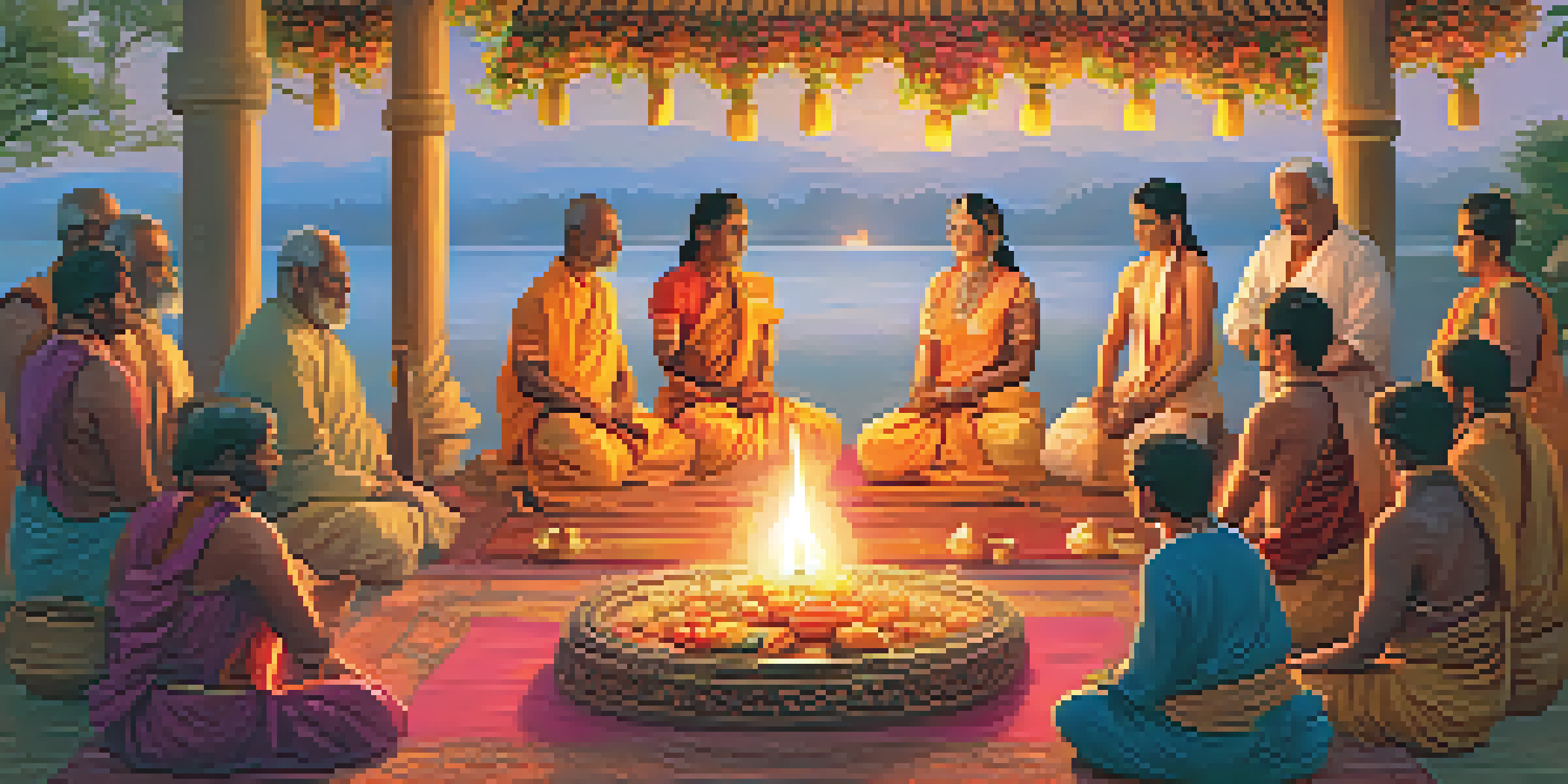Soma: The Sacred Drink in Vedic Traditions and Its Mystical Uses

Introduction to Soma: The Elusive Sacred Drink
Soma, often described as a divine elixir, holds a prominent place in Vedic traditions. It is mentioned extensively in ancient texts, particularly the Rigveda, where it's celebrated for its intoxicating and uplifting properties. But what exactly is Soma, and why is it so revered? This drink, believed to be both a physical substance and a spiritual experience, invites us to explore deeper meanings beyond its mere consumption.
The journey of a thousand miles begins with one step.
The exact ingredients of Soma have been a topic of debate among scholars and enthusiasts alike. Some suggest it might have been derived from various plants, while others propose it could be a symbolic representation of spiritual awakening. Regardless of its physical form, Soma is often associated with the gods and the cosmos, bridging the gap between the earthly and the divine.
Understanding Soma requires not just a historical perspective but also an appreciation for its mystical connotations. As we delve into the rituals surrounding Soma and its significance, we uncover the layers of meaning that this sacred drink embodies, revealing insights into the Vedic worldview and its spiritual practices.
The Historical Context of Soma in Vedic Culture
To truly appreciate Soma, it helps to understand the historical backdrop of Vedic culture. Emerging around 1500 BCE in the Indian subcontinent, this period was marked by a deep connection to nature, spirituality, and ritualistic practices. Soma was not merely a drink; it was integral to religious ceremonies and was believed to enhance the spiritual experience of the participants.

The Vedic texts describe elaborate rituals where Soma was prepared and consumed, often accompanied by chanting and offerings to deities. This underscores the drink's role as a conduit for communication with the divine, emphasizing the belief that consuming Soma could lead to enlightenment and blessings from the gods. It was considered a means to achieve immortality and a higher state of consciousness.
Soma's Spiritual Significance
Soma is revered in Vedic traditions as a divine elixir that symbolizes the quest for transcendence and spiritual awakening.
Through these rituals, the significance of Soma transcended its physical properties, becoming a symbol of divine connection. The communal aspect of Soma consumption fostered a sense of unity among participants, reflecting the communal ethos of Vedic society. This historical context enriches our understanding of Soma's role in shaping spiritual practices that resonate even today.
Soma's Symbolism: More Than Just a Drink
Soma embodies more than just a liquid; it symbolizes the quest for transcendence and self-realization. In Vedic philosophy, the act of consuming Soma is often likened to the spiritual journey of overcoming ignorance and embracing enlightenment. This metaphorical interpretation encourages individuals to seek their own 'Soma' in life—experiences or practices that elevate their consciousness.
The mind is everything. What you think, you become.
The duality of Soma as both a tangible drink and an intangible experience represents the interplay between the physical and spiritual realms. Just as the drink was believed to invigorate the body, it also served as a catalyst for profound spiritual insights. This connection reminds us that our earthly experiences can lead to higher understanding and fulfillment.
Today, many spiritual seekers draw parallels between Soma and modern practices that promote mindfulness and self-discovery. Whether through meditation, yoga, or other holistic approaches, the essence of Soma lives on, encouraging individuals to explore deeper dimensions of their being and connect with the divine.
The Rituals Surrounding Soma Consumption
The rituals associated with Soma consumption were intricate and steeped in symbolism. These rites often involved offerings to the gods, chanting of sacred hymns, and the preparation of Soma itself, which was a labor of love and devotion. Participants believed that these rituals not only honored the divine but also transformed the drink into something sacred, imbued with spiritual potency.
During these ceremonies, the atmosphere was charged with reverence and anticipation. The preparation of Soma was considered an art form, where specific techniques and ingredients were carefully selected to enhance its effects. This meticulous process highlighted the belief that the quality of the experience depended on the dedication and intention behind the rituals.
Historical Rituals of Soma
The intricate rituals surrounding Soma consumption highlight its role as a bridge between the earthly and the divine in Vedic culture.
As these rituals unfolded, participants often reported feelings of ecstasy, unity, and a deep connection to the cosmos. This shared experience fostered a sense of community and collective consciousness, reinforcing the idea that the divine is accessible to all who seek it. The rituals surrounding Soma thus became a cornerstone of Vedic spiritual life, illustrating the profound link between practice and belief.
Soma in Modern Interpretations and Practices
In contemporary society, the concept of Soma has evolved, inspiring various interpretations and practices. Many individuals find themselves drawn to the idea of Soma as a metaphor for spiritual awakening and personal transformation. This modern perspective encourages a holistic view of health and well-being, integrating physical, mental, and spiritual dimensions.
Yoga and meditation practices, often seen as modern-day equivalents of the Soma experience, emphasize mindfulness and self-awareness. These practices invite individuals to explore their inner landscapes, fostering a sense of peace and connection that echoes the ancient experiences associated with Soma. Today, many people seek their own forms of 'Soma' to enhance their spiritual journeys.
Furthermore, the resurgence of interest in herbalism and natural remedies has led to a renewed curiosity about traditional plants that might have been used to create Soma. This exploration not only honors ancient wisdom but also encourages individuals to reconnect with nature and their inner selves, continuing the legacy of Soma's transformative power.
The Role of Soma in Vedic Meditation and Yoga
Soma's influence extends into the realms of Vedic meditation and yoga, practices that aim to cultivate inner peace and clarity. Just as Soma was believed to enhance spiritual experiences, these practices offer pathways to connect with the divine within. The concepts of mindfulness and presence resonate deeply with the essence of Soma, inviting practitioners to engage fully with their experiences.
In Vedic meditation, the focus is on transcending the mind and reaching a state of pure consciousness, akin to the elevated state sought through Soma consumption. This parallel illustrates how ancient practices continue to inform modern spiritual pursuits, bridging the gap between past and present.
Modern Interpretations of Soma
Today, Soma inspires contemporary practices like yoga and meditation, encouraging individuals to seek their own forms of spiritual awakening.
Moreover, the practice of yoga, with its emphasis on breath and movement, mirrors the rituals associated with Soma. Both aim to harmonize the body and spirit, fostering an experience of unity and connection. As practitioners delve into these ancient arts, they rediscover the timeless wisdom that Soma embodies, finding relevance and inspiration in their own spiritual journeys.
Conclusion: Embracing the Legacy of Soma
Soma, as a sacred drink in Vedic traditions, represents a profound legacy that transcends time and culture. Its rich history, symbolism, and rituals invite us to explore our own spiritual paths and seek connections with the divine. Whether through ancient practices or modern interpretations, the essence of Soma continues to inspire individuals on their quests for enlightenment.
By embracing the teachings and practices associated with Soma, we can cultivate a deeper understanding of ourselves and our place in the universe. This journey encourages us to honor the past while actively engaging with the present, allowing the wisdom of ancient traditions to inform our lives today.

Ultimately, the legacy of Soma reminds us that the search for spiritual fulfillment is a timeless pursuit. As we navigate the complexities of modern life, we can draw inspiration from the sacred drink, discovering our own paths to transcendence and connection with the divine.